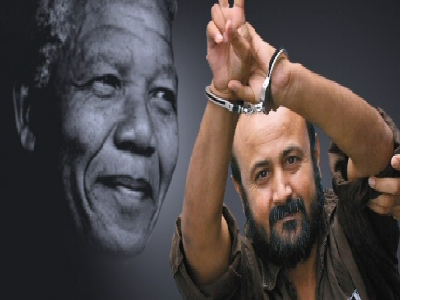
Some 1,500 Palestinian prisoners out of approximately 6,300 Palestinians held by Israel entered the 14th day of an open-ended hunger strike on Sunday, with Israeli prison authorities ramping up punitive measures in an attempt to pressure prisoners to break their strikes — as the health of hunger strikers continued to decline.
The media committee for the “Freedom and Dignity strike,” formed by the Palestinian Committee of Prisoners’ Affairs and the Palestinian Prisoner’s Society (PPS), announced that preliminary efforts to start negotiations between hunger strikers and the Israeli Prison Service (IPS) began Saturday.
According to the committee, IPS said negotiations would be based on the condition that they exclude Marwan Barghouthi, a prominent imprisoned member of the Fatah movement who is leading the strike.
RT PalestineChron "13 Palestinian Journalists Injured while Covering Jerusalem Sit-in https://t.co/YhMSRxyNgu via… pic.twitter.com/eXMtjm1SXr"
— Richard Hardigan (@RichardHardigan) May 1, 2017
Head of PPS Qaddura Fares insisted that Israeli authorities involve Barghouthi. “A straight line is the shortest distance between two points,” he said.
Fares urged the Palestinian people to remain determined in the battle to achieve the hunger strike’s demands, which include bringing an end to the torture, ill treatment, and medical neglect of Palestinians prisoners by Israel.
In response to a request for comment, IPS spokesperson Hana Herbst denied that IPS would be involved with any negotiations, saying: “The Israel Prison Service manages prisoners and their living conditions and does not negotiate with prisoners.”
The media committee also reported Sunday that IPS forces assaulted hunger-striking prisoner Nasser Uweis, who is held in a solitary confinement cell in Ramla prison. Uweis was sentenced to life in prison in 2002.
Meanwhile, IPS has continued suppressive measures against hunger striking prisoners, notably moving Karim Yunis, the longest-serving Palestinian prisoner, from a solitary confinement cell in al-Jalama prison in Haifa — where he was placed on the first day of the hunger strike — to a solitary confinement cell in Gilboa prison in Nazareth some 50 kilometers away.
Since the the launch of the strike, IPS has continuously been transferring hunger strikers into solitary confinement and between different Israeli prisons in an attempt to separate hunger strikers from one another and break the strike.
Solidarity with Marwan Barghouti and Palestinian prisoners' #DignityStrike ?????? https://t.co/oFF6mYsomF pic.twitter.com/jgq1PRcpbQ
— Peter Feld (@peterfeld) April 30, 2017
The media committee said that IPS has continued to ban lawyers from visiting Palestinian prisoners on hunger strike, except at Ofer prison in the central occupied West Bank district of Ramallah and Ashkelon prison in southern Israel.
A hearing has been scheduled at the Israeli Supreme Court for May 3, following a petition submitted by lawyers to secure their right to visit the hunger-striking detainees, according to the committee.
Meanwhile, PPS lawyer Khalid Mahajna appealed IPS’s decision to ban lawyer visitations at the Israeli magistrate court in Beersheba on Sunday, on behalf of Mujahid Hamid and Haroun Ayyad, who are held at Ashkelon prison, and Ali Elayyan who is held at Nafha prison.
WATCH: Today, Palestinians from Marwan Barghouti's village of Kobar march around the village chanting support for the hunger strikers. pic.twitter.com/JQWWZXEOpf
— The IMEU (@theIMEU) April 26, 2017
Following a visit to Ofer prison, lawyer Luay Akka from the Palestinian Committee of Prisoners’ Affairs said that hunger strikers were still being subjected to daily raids in the early dawn hours, with IPS officers also attempting to conduct strip searches on hunger-striking prisoners.
Prisoners in Ofer have reported that IPS officers confiscated their clothes, leaving them with only their prison uniforms that they are permitted to wash just once a week. They have also been deprived of access to cold water, despite the warm weather, according to Akka.
Akka said that IPS forces were confiscating salt that hunger strikers have been using to balance their health amid the strike, and that prison officers have also been taunting prisoners by placing food in front of them, which Akka denounced as “psychological torture.”
Marwan Barghouti son is calling on the world to show solidarity with hunger strikers by joining the #SaltWaterChallenge #تحدي_مي_وملح pic.twitter.com/vnsbefLPqF
— Muhammad Smiry (@MuhammadSmiry) April 25, 2017
Meanwhile, the media committee said that the medical conditions of hunger strikers were on a steady decline, reporting symptoms such as severe pains throughout their bodies, severe headaches, and continued weight loss.
The media committee also announced on Saturday that lawyers from prisoners’ support groups like PPS and the prisoners’ committee would completely boycott Israeli court in cases related to political Palestinian prisoners.
A similar boycott was announced on the second day of the hunger strike, but the media committee clarified that the lawyers had decided to stop pleading on behalf of Palestinian prisoners, except in hearings over whether or not to extend the remand of detainees.
(Ma’an, PC, Social Media)




